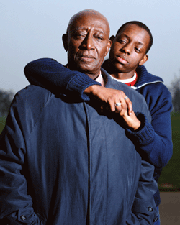|
Talking with Family and Friends
Helping Children and Teens Cope
Ways to Stay Involved in Your Children's Lives
How Children May React, and What to Do*
Tips for Talking With Children of Different Ages
Communicating with Your Partner with Cancer
Communicating with Other Family Members and Friends
"This is the only childhood they
will ever have, a crucial time of
development. Choose to see your
illness not as an obstacle but as
a powerful platform from which
your messages are amplified,
helping your children
understand and believe you and
feel your love in a powerful
way....When the facts are
couched in love and
hopefulness, you can guide
your children toward a life-enhancing
perception of reality."
- Wendy Harpham, MD*
Children as young as 18 months begin to understand the world around them. It's important to be
honest with them and explain that your loved one has cancer. Experts say that telling children the
truth about cancer is better than letting them imagine the worst.
Your own daily stresses and fears can affect how you act with your kids. You may be torn between
wanting to give time to your kids, and knowing your loved one with cancer also needs your time.
That's why it's good to let children know how you are feeling, as well as to find out how they are
feeling. And never assume you know what your children are thinking. You don't know how they
will react to information, either.
* Harpham, W. 1997. When A Parent Has Cancer: A Guide to Caring For Your Children. New York, NY; HarperCollins Publishers Inc.,
pp. 3, 8. Adapted with permission.
This section provides ideas for helping children cope.
For some families, talking about serious issues is very
hard. But as hard as it may be, not talking about them
can be worse. Here are some things you might want to
say to children of any age about your loved one's cancer:
- "Nothing you did, thought, or said caused the
cancer."
- "You are not responsible for making her well.
But there are ways you can help her feel better
while the doctors try to make her improve."
- "You can't catch cancer from another person."
- "Just because someone has cancer doesn't mean
other people in the family will get it - even later.
And that includes you."
- "It is okay to be upset, angry, scared, or sad
about all this. You may feel all kinds of feelings.
You'll probably feel happy sometimes, too. It's
fine to feel all these things."
- "No matter what happens, you will always be taken care of."
- "People may act differently around you because they're worried about you or worried
about all of us."
 Talking about the impact of cancer may be hard for very young children. You might try asking
them to draw a picture of the person with cancer. Or have them play dolls, with one doll
being the patient. Other forms of art can help older children express themselves.
Talking about the impact of cancer may be hard for very young children. You might try asking
them to draw a picture of the person with cancer. Or have them play dolls, with one doll
being the patient. Other forms of art can help older children express themselves.
Keep in mind that young children may ask the same question over and over. This is normal, and
you should calmly answer the question each time. Teens may ask difficult questions or questions
for which you don't have answers. Be honest with them. Remember that thinking through these
issues is part of your children's process of growing up.
Be prepared for questions and concerns about death from your children. They may worry, even if
your loved one's prognosis is good.
- Teach them that cancer is an illness. If your loved one's prognosis is good, let them know
that the type of cancer he or she has is one the doctors feel they can treat.
- Ask them what they think about your loved one's cancer and what they worry about. Then
listen patiently to their answers. Correct misinformation.
- Tell them the truth, couched in love and hopefulness. Instead of trying to convince them
of a good outcome that you can't guarantee, reassure them that your loved one is getting
good care, you are hoping for a recovery, and that you can live well
with the uncertainty.
- Teach your children that even if the unexpected happened due to cancer or anything else,
they would be taken care of and be okay. Although they would feel sad for a while and they
would miss your loved one, they would also feel that love forever and learn how to be
happy again.
- Remind them that your loved one is not dying now. Reassure them that you will tell them if this
ever changes and dying becomes a possibility. Conclude by telling them you expect and
hope your loved one to get better, and encourage them to focus on today.
It can be hard to remain active in your children's lives during your loved one's treatment. But it
may be more important than ever to do so. Below are some ways that other caregivers
have stayed connected with their children.
- Focus on the most important activities.
If you can only do one thing with each of your children, what's most important?
Make a list of all the options. If possible, get the children's input. You may be
surprised by what they choose.
- Send someone else.
Is there another adult in your child's life who can go to an event that you can't?
Maybe this adult can videotape or take pictures of the event.
- Carpool.
Take turns driving with other parents.
- Be around before and after.
Try to be around to help prepare your children for an activity and to welcome
them home.
- Ask for a replay.
If you can't be there, sit down with your children to hear about what they did.
Or have your children re-create some of the things that happened.
- Create new ways of connecting.
Come up with new ways to connect. Make a point of tucking them in at bedtime,
eating together, or talking on the phone or by e-mail. Have a set time when your
children do homework while you do something else in the same room. Or take a
walk together. Even 5 minutes alone with each child without interruptions can
make a world of difference.
- Involve your children in "your" activities.
Could your children join you for any of your activities? Even going to the grocery
store could be time spent together. Your children may feel special if they can
attend adult events with you.
- Stay involved with their schooling.
Check with their teachers to find out how your children are doing in school. Or
ask a guidance counselor or coach for input.
|
Children react to a loved one's cancer in many different ways. They may:
- Be confused, scared, angry, lonely, or overwhelmed
- Be scared or unsure how to act when they see the treatment's effects on your loved one
- Act clingy or miss the attention they used to get
- Feel responsible or guilty
- Get angry if they're asked to do more chores around the house
- Get into trouble at school or neglect their homework
- Have trouble eating, sleeping, keeping up with schoolwork, or relating to friends
- Be angry that someone else is taking care of them now
These behaviors are normal. Still, your child may need extra support to deal with their troubles.
(See the tips on the next page.)

With teens, problems may be less obvious or more complicated than with younger children. Here
are some things to keep in mind:
- Teens are supposed to be moving toward independence from their families. This is natural
for them. Cancer makes this harder to do, leading some teens to act out or withdraw.
- Teens may give off the message, "leave me alone." But they still need and want your
attention and support.
- Being a teen is always stressful. Some moods you
see may have nothing to do with your loved
one's illness.
- Teens want to feel normal. Make sure that they
have time for regular activities.
- Keep the lines of communication open. Involve
teens in decisions as much as possible. Make sure
that they have someone to talk to about what is
going on in their life. It may be hard for you to
stay on top of your teen's activities and feelings
right now. If so, ask another responsible adult to
stay connected with your teen.

- Remind them that you love them.
- Set aside special time that each child can spend with you
or your loved one.
- Try to stick to reassuring routines, such as reading
bedtime stories or checking in with them after school.
- Be together, even if you are each doing different things in
the same room.
- Prepare children for changes and side effects of treatment (such as hair loss,
vomiting, or tiredness) so they won't be surprised.
- Remind your children that your loved one may seem worse for a while before he
gets better. Explain that this is part of the treatment that can help make him better
in the end.
- Help your children talk about their feelings and ask you questions. Let them know
you're listening and validate their feelings.
- Find new ways to give your children attention. You may want to leave notes where
they will find them or schedule special phone conversations if you're spending a lot
of time at the hospital or away from home.
- Think of a special treat your children might enjoy.
- Encourage them to talk with other kids or adults to ease their loneliness.
- It isn't okay for your kids to respond to the changes at home by stopping normal
activities or letting grades and friendships slide. Find out why your children have
stopped any usual activities. They may be:
- Feeling tired
- Feeling unhappy
- Having trouble getting along with friends
- Unable to concentrate or succeed
- Talk about the importance of adjusting to these changes at home. Ask your children
how you can help them get back to their normal routines.
- State clearly, and remind them, "You did not cause the cancer. You can't cause cancer
by anything you do, think, or say."
- Explain in simple ways how cancer develops.
- Read a children's book together for children of loved ones with cancer.
- Ask a doctor or nurse to explain the facts.
(for example, having to be quiet, doing more chores, missing out on fun activities with friends)

- Validate their feelings. Talk with them about what is causing the anger. Even though
you may know the anger comes from fear or fatigue, it's important to listen to what
they say and acknowledge their feelings.
- Help your children
understand that their
anger may be a stand-in
for something else.
Maybe they're really
angry at the cancer or at
the family. Maybe they're
scared or worried. Or
maybe they're sad.
- Do your best to try not to
get angry back at them.
Again, the anger is
probably about
something else.
- Tell your children that you understand how they feel. You know that this situation
is hard.
- Find out if they are acting out of fear, anger, loneliness, or boredom. Whatever the
feeling, remind them that it is okay to feel that way. But it is not okay to act out in this
way. If necessary, ask a teacher, pediatrician, or counselor for advice and support.
|

- Plan to talk for a very short time. Children this age
can focus only for brief periods.
- Be clear and simple. It may help to draw a picture
of what is happening.
- Tell them about any changes in their routine for
the day or in the near future.
- Offer to answer any questions and to talk any time.
- Plan to talk for a short time. Children this age can focus only for brief periods. Plan
more than one talk to cover what you need to say.
- Remember that young children may have strong feelings. They may express them by
focusing on something else during your talk. This is okay. It allows them to deal with
information and feelings at their own pace.
- Use examples. You could remind them of a time when they got sick and went to a
doctor to get better.

- Help them to understand the things that
will be happening soon. Children this age
can't think weeks or months into the future.
- Let them know they will be taken care of
and by whom.
- Answer all their questions. Invite them to
talk more later.
- Plan for a slightly longer talk. Let your children set the pace of the talk.
- Find out if your children already know the facts about cancer. Make sure that
what they have heard applies to your loved one's situation. If not, give them the
right information.

- Be aware that your children may ignore or avoid topics when they are afraid.
- Use simple, concrete
information. For example, you
could explain that there is a
lump in your loved one's body
that needs to be removed.
- Talk not only about now, but also
about the future. For example,
tell them how the cancer may
affect your family at holidays or
upcoming events.
- Tell your children you will do
your best to answer their questions. Let them know you're there to talk whenever
they want.

- You may be able to have a longer talk. Let your teens set the pace.
- Be prepared if your teens try to ignore or avoid topics. Teens may act this way
because they're afraid or even embarrassed. They may not want to talk about your
loved one's body. This may be especially true if your loved one's cancer is in the
breast or sex organs.
- Teens often need time to themselves to deal with their feelings. They may want to be
alone or with friends. Give them this time.
- Teens should be told the facts about the cancer. This can help you correct any wrong
information that they may have. Give your teens booklets to read later. They may
want to do their own research. If so, make sure that what they learn is from a reliable
source and applies to your loved
one's situation.
- Often teens ask many "what if"
questions. They may want to know
more about the future. Again, answer
their questions as best you can. And
let them know you'll be glad to talk
again later.
- Teens may also want to know how the
cancer will affect them. Will it disrupt
their social life? Will they have to do
more chores? This is normal. Be
honest with them.
|
"I try to give my husband
time to think things
through. Not to be so
quick to try and fix
everything."
- Pauline
Some relationships get stronger during cancer treatment.
Others are weakened. Nearly all caregivers and their
partners feel more stress than usual as a couple. They often
feel stress about:
- Knowing how to best support each other
- Dealing with new feelings that come up
- Figuring out how to communicate
- Making decisions
- Changing roles
- Juggling lots of roles (such as childcare, housekeeping, work, and caregiving)
- Changing their social life
- Changing their daily routine
- Not feeling connected sexually
People express their emotions differently. Some like to talk things out or focus on others. Others
like to express emotions by doing things, such as washing the dishes or fixing things around the
house. They may be more likely to focus inward. These differences can cause tension because each
person may expect the other to act the way they would in their place. To reduce stress, it may help
to remind yourself that everyone reacts differently.
Bringing up tough subjects is emotionally draining. You may think, for example, that your loved one
needs to try a different treatment or doctor. Or she may be worrying about losing independence,
being seen as weak, or about being a burden to you, but doesn't want to talk about it. Here are some
tips on how to bring up hard topics:
- Practice what you'll say in advance.
- Know that your loved one may not want to hear what you have to say.
- Find a quiet time and ask if it's okay to talk.
- Be clear on what your aims are. (Let your loved one know why you are having this talk and
what you hope will come from it.)
- Speak from your heart.
- Allow time for your loved one to talk. Listen and try not to interrupt.
- Don't feel the need to settle things after one talk.
- You don't have to always say, "It'll be okay."
Sometimes the best way to communicate with someone is to just listen. This is a way of showing
that you are there for them. It may be one of the most valuable things you can do. And it's
important to be supportive to whatever your loved one wants to say. It's her life and her cancer.
People need to process their thoughts and fears in their own time and their own way. You could
also ask whether she is willing to think about the issue and talk another time. Your loved one may
even prefer to talk with someone else about the topic.
Some people won't start a conversation themselves, but may respond if you begin first. Here are
some ways caregivers do this:
- "I know this is hard to talk about, but know that I'm ready to listen or to talk any time."
- "I feel that it would be helpful to talk about how your treatment is going so far and how we're
both coping with it. Would you be willing to talk with me about that sometime this week?"
Sometimes it helps to ask other caregivers how they talk to those close to them. For example, you
may want to ask:
- How do you keep another person's feelings in mind when you're coping with so many
feelings of your own?
- How do you talk about tough topics and still stay supportive?
If you continue to have trouble talking about the cancer and painful issues, you could ask for help
from a mental health professional. One may be able to explore issues that you didn't feel you could
yourself. But if your loved one doesn't want to go with you, you can always make an appointment to
go by yourself. You may pick up some ideas for how to bring up these topics, and talk about other
feelings that you are coping with right now.
"I've noticed that my
husband tries to stay really
positive with everyone else,
even his parents. He'll say
he's doing great. This is
frustrating for me because
at home, I see that he isn't
doing great."
- Betty
Some couples find it easier to talk about serious issues
than other couples. Only you and your partner know how
you feel about this. The sections below may help you think
about ways to communicate that work for both of you.
Some things that cause stress for you and your partner
can't be solved right now. Sometimes talking about these
things can be helpful. You may want to say up front, "I
know we can't solve this today. But I'd like to just talk
about how it's going and how we're feeling."
Topics to explore may include how each of you:
- Deals with change and the unknown
- Feels about being a caregiver or being
cared for
- Handles changing roles in your relationship
or home
- Wants to connect with one another
- Sees what issues may be straining the relationship
- Feels, or would like to feel, cared for and
appreciated
- Feels thankful for the other person
"I feel like it's been such a
blessing to be able to show
my husband way beyond
words how much I love him.
And to see him fighting
cancer because of his
feelings for our children
and me. It's a privilege to
be so closely involved in
something of such value and
importance."
- Rose Mary
You and your partner may need to be a team now
more than ever. It may help to think things
through together:

- Which decisions should you make together?
- Which decisions should each of you make alone?
- What were some other tough times that you got through together? How is this situation the
same or different?
- Which family tasks could you share?
- What kinds of tasks are easier for you? Which ones
are harder?
- What does each of you need?
- How can others help?
Perhaps your partner used to do a lot to keep your family going. And now you're trying to get used
to less help. It may also be hard to notice the small things your partner is doing to get through this
hard time. There's just too much going on. But when you can, try to look for these things, and
thank your partner for doing them. Showing a little gratitude can make both of you feel better.
Many couples find that it helps to plan special occasions. Some days may end up being better than
others for these dates, depending on how your partner feels. So you may need to be okay with lastminute
changes.
You don't have to be fancy. It's about spending time together. That can mean watching a video,
going out to eat, or looking through old photos. It can be whatever you both like to do. You can
also plan these dates to include other people, if you miss being around others.
"After 42 years of marriage,
there's that bond that we
don't need words."
- Gayle
You may find that you and your partner's sex life is different than it used to be. Many things could
be affecting it:
- Your partner is tired, in pain, or uncomfortable because of the treatment.
- You're tired.
- Your relationship feels distant or strained.
- You or your partner may not be comfortable with
the way your partner looks.
- You may be afraid of hurting your partner.
- Your partner's treatment might be affecting his or her interest in sex or ability to perform.
You can still have an intimate relationship in spite of these issues. Intimacy isn't just physical. It
also involves feelings. Here are some ways to improve your intimate relationship:
- Talk about it. Choose a time when you and your partner can talk. Focus on just talking.
Talk about how you can both renew your connection.
- Try not to judge. If your partner isn't performing, try not to read meaning into it. Let your
partner talk - or not talk - about what he or she needs.
- Make space. Protect your time together. Turn off the phone and TV. If needed, find
someone to take care of the kids for a few hours.
- Take it slow. Reconnect. Plan an hour or so to be together without being physical. For
example, you may want to listen to music or take a walk. This time is about reconnecting.
- Try new touch. Cancer treatment or surgery can change your partner's body. Areas where
touch used to feel good may now be numb or painful. Some of these changes will go away.
Some will stay. For now, you can figure out together what kinds of touch feel good, such as
holding, hugging, and cuddling.
- Talk to a therapist or counselor. There are many who deal with intimacy and sexuality
issues with cancer patients.
Any problems your family may have had before the cancer
diagnosis are likely to be more intense now. This is true
whether you are caring for a young child, an adult child, a
parent, or a spouse. Your caregiver role can often trigger
feelings and role changes that affect your family in ways
you never expected. And relatives you don't know very
well or who live far away may be present more often, too,
which may complicate things. Some people have said that:
- Seeing your adult child ill can trigger feelings of
needing to protect or help him or her.
"Watching my daughter go through cancer is really
painful for me. I can't stand not being able to help
her. But they won't let me help out. She and her
husband like to handle things by themselves."
- Seeing your parent as someone who needs your help
can be hard to accept.
"My mother got cancer. Just like she nursed me
back to health as a child, I wanted to do the same
for her. Yet she's used to doing everything herself.
She keeps saying, 'I'm still your mother.'"
"I have my own life, with young kids to take care of,
and a job. It's hard trying to figure out how to help
my dad."
- Seeing an in-law or a friend's parent worry or try to
help out can feel like "too much."
"I need to run my own home. I know his mother
just wants to help, but she's too much in my
business right now."
| Communication Troubles |
|
Studies show that open and caring
communication works best. Yet
caregivers often run into:
- Tension from different ways of
communicating
- Lack of sensitivity or
understanding about
appropriate ways to talk and
share feelings
- People who don't know what to
say, won't communicate at all,
or won't be honest

|
"You do want to stay
positive and upbeat. But at
the same time, I feel like
you want to share your
reality with other people in
your family so that they can
know how to support you
and how not to be shocked
if things get worse."
- Ken
Sometimes other close family and friends may not agree
on what should be done. It's very common for families to
argue over treatment options. Or they argue that some
caregivers help more than others. While everyone may
be trying to do what they think is best for your loved one,
family members may disagree about what this means.
Everyone brings their own set of beliefs and values to the
table, which makes decisions hard. It is often during these
times that families ask their health care team to hold a
family meeting.
Talk with your loved one to see if she wants a family
meeting. Ask if she would like to be involved. At the
meeting, all members share as much information as they
can. You can ask a social worker or counselor to be there,
if needed. If you need to, you can bring a list of issues to
discuss. Meetings can be used to:
- Have the health care team explain the goals for treatment.
- Let the family state their wishes for care.
- Give everyone an open forum in which to express their feelings.
- Clarify caregiving tasks.
During these meetings, family members may want to talk about how they feel. Or you may want to
decide what kind of help they can offer. Each person may have certain skills to offer.
At the end of the meeting, ask the health care team to summarize and plan the next steps.
Sometimes when one person feels like talking about important things, the other person doesn't.
Try choosing a time when you and the person you want to talk to won't be doing other things.
Find a quiet place, turn off the TV, and don't answer the phone.
Often, you will be the main person updating family, friends, and coworkers about how the patient
is doing. Ask your loved one what he wants to share, with whom, and when. If this is a task that
someone else can do, select a "point person." This person can make phone calls or send e-mail or
letters to update others. It's important to let others who care know whether your loved one likes
getting cards, calls, or visits.
"My sister-in-law came by
and commented on how
much television the kids
were watching. She made
some remark about how she
knew I was stressed, but
could I find something
better for them to do? It's
like she was trying to make
me feel like a bad mother
or something."
- Carrie

If people offer help that you don't need or want, thank them for their concern. Let them know
you'll contact them if you need anything. You can tell them that it always helps to send cards and
letters. Or they can pray or send good thoughts.
Some people may offer unwanted parenting advice.
This may come from feeling helpless to do anything, yet
wanting to show their concern. Since they can't offer
advice on medical care, it helps them to express their
opinion on child care. While it may come from a good
place, it may still seem judgmental to you.
It's your decision on how to deal with unwanted advice
about your kids. You don't have to respond at all if you
don't want to. If you think their concerns are valid,
then talk to a counselor or teacher about what steps to
take. Otherwise, thank them. And reassure them that
you are taking the necessary steps to get your children
through this tough time.
Back to Top
< Previous Section | Next Section > |